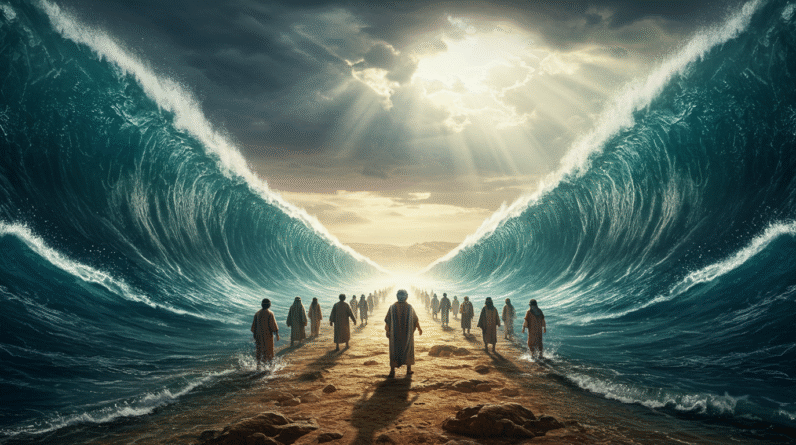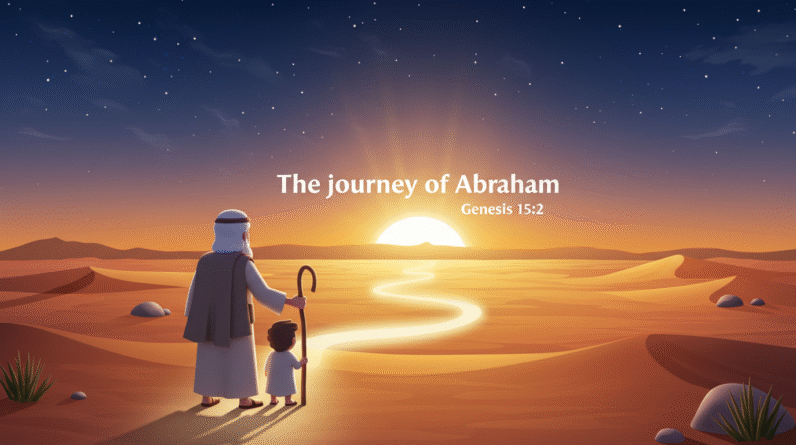Explore Jacob’s transformation through divine encounters in Genesis. A struggle with identity and faith that resonates with modern quests for purpose and meaning.
Jacob: Wrestling With God – Genesis 28:10-22; Genesis 32:22-32
At the heart of the Bible’s narrative lie stories that grapple with the complexities of human nature, divine plans, and the interplay between the two. Among these narratives, the life of Jacob emerges as a rich tapestry of struggle, transformation, and ultimate redemption. Jacob’s journey, vividly captured in Genesis 28:10-22 and Genesis 32:22-32, resonates with anyone who has ever wrestled with their faith, identity, or destiny.

Jacob in the Bible
Jacob, one of Isaac’s sons and Abraham’s grandson, stands out as a central figure in the biblical saga. His story is one of family, deception, and divine encounters. From the very beginning, Jacob’s life was marked by struggle, even wrestling with his twin brother Esau in the womb. His name, which can mean “heel grabber” or “deceiver,” hints at the contentious path ahead.
Jacob is best known for two pivotal events: his dream at Bethel and his wrestling match at Peniel. As a young man fleeing from his brother Esau’s wrath after deceitfully obtaining the birthright and blessing, Jacob sets out on a journey laden with uncertainty and fear. It is amidst this turmoil that Jacob experiences a divine encounter—a dream of a ladder reaching heaven, with angels ascending and descending, and a reaffirmation of God’s covenant with Abraham. This scene, detailed in Genesis 28:10-22, serves as a turning point in Jacob’s life, marking the beginning of a new understanding of God’s presence and promise.
Years later, in a dramatic night-time encounter at the River Jabbok, as Jacob prepares to reunite with Esau, he finds himself wrestling with a mysterious figure until daybreak. This profound moment, depicted in Genesis 32:22-32, results in a transformation not only in name—from Jacob to Israel, meaning “he struggles with God”—but also in character. Here, we witness a true metamorphosis, where Jacob confronts his deepest fears and emerges with a new identity, solidifying his pivotal role in the lineage of Israel.
Lessons from Jacob’s Life
Jacob’s life offers a multitude of lessons, beginning with the nuances of personal transformation and faith. His journey reminds us that moments of struggle can serve as catalysts for spiritual growth and self-discovery. Despite early missteps—deceit towards his father Isaac and his brother Esau—Jacob’s story reinforces the idea that redemption is always within reach. It reveals that personal growth is not only possible but expected, as each struggle can lead to greater maturity and understanding.
Furthermore, Jacob’s encounters with the divine illustrate the importance of acknowledging God’s presence in our lives. His vision at Bethel teaches us about recognizing life’s sacred aspects, even amid normalcy or crisis. This realization calls us to remain open to spiritual encounters in our everyday lives, urging us to find the divine ladder connecting heaven and earth through our faith and actions.
Lastly, the wrestling match with God underscores the value of perseverance and faith. Jacob’s determination and refusal to let go, even after his hip is touched and dislocated, signifies the importance of clinging to faith and blessings, especially in the face of adversity. It’s a testament that our struggles, though challenging, are often pathways to divine transformation and renewal.
Connection to Today’s World
In today’s world, Jacob’s story resonates with the universal quest for identity and purpose. Many people find themselves wrestling with these concepts amidst the noise of modern life, much like Jacob at the River Jabbok. His journey provides solace and guidance, encouraging us to confront our challenges directly, honestly, and with faith in a better outcome.
The dream at Bethel mirrors our search for meaning in a chaotic world. It reassures us that there is a divine order and purpose to our lives, despite the chaos surrounding us. In an age where technology often eclipses spiritual contemplation, Jacob’s story reminds us of the importance of quiet reflection and the recognition of divine guidance in our paths.
Key Bible Verse
Jacob’s interaction is best encapsulated in the verse, “Then he said, ‘Let me go, for it is daybreak.’ But Jacob replied, ‘I will not let you go unless you bless me.’” (Genesis 32:26). This verse signifies Jacob’s tenacity and determination to seek blessings and transformation even in the face of divine confrontation, showcasing the potential harbored in our struggles.
Thought-Provoking Question
Reflecting on Jacob’s journey prompts an important question: When faced with life’s wrestles, are you willing to hold on and seek transformation, or do you shy away at the signs of discomfort and challenge?
Incorporating the lessons of Jacob’s life into your journey can enlighten your path. Remember, every struggle can lead to a deeper understanding of your purpose and connection to the divine.







